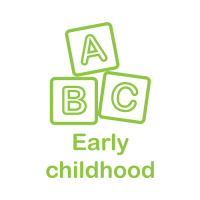Before you start your new role as a hub leader, watch the video below to get some inspiration from the Hume hub leaders in Victoria on how they have adapted to the unique needs of their communities.

Your first week is all about getting oriented with your school and meeting the staff
This checklist will guide you through what you should cover in your first week:
- Induction into the school and hub space.
- Meet the school staff team.
- Obtain a calendar of important dates for your school – school staff meetings, P&C meetings and whole school celebration days. This will inform your planning and help you promote community hub events and activities.
- Make yourself available to help in the school. When the school community sees you contributing to their broader activities, this will encourage them to support you.
- Familiarise yourself with the school routine and begin meeting families. Prep families are a great place to start.
- Start thinking about possible activities, given the physical space available.
- Meet your hub support coordinator and have an induction on the national community hubs program. Your support coordinator will talk to you about their role in supporting your hub to achieve its outcomes, as well as objectives, outcomes, philosophy and reporting requirements.
- Consider your local area, identify the main cultures that exist in the area and try to identify the local leaders.
- Make contact with the other hub leaders in your area and arrange a visit to their hubs in the coming weeks. Your support coordinator and school will be able to assist you with this.
Hub leader tip: have a discussion with your principal, leadership team and staff
Ask a general question – What do you imagine a hub is? What are your thoughts on what a hub does? What needs can you see in the community?


Engagement and early childhood programs are a great place to start. Discuss with your support coordinator what programs or local services you could introduce to your hub.

Your first month is all about getting to know your community and embedding yourself in school life
This checklist will help guide you through what you should cover in your first month:
- Arrange a visit to at least one other community hub in your area. Spending time in another hub will give you plenty of inspiration and it’s a great way to connect with your peers locally. Your support coordinator will be able to help you arrange a visit.
- Start building a network of contacts in the area and form partnerships to provide programs and services. Your principal, support coordinator and other hub leaders can help you with this.
- Attend school assemblies and any events that are run during the school term.
- Offer to help out and support families during events at your school.
- Develop a timetable for the rest of the term and share this with your principal, support coordinator, the school staff, families at the school and your contacts in the community.
- Put up the CHA-supplied sign, order more (if required) and familiarise yourself with the CHA visual identity guidelines for naming and branding.
- Write and publish an article for the school newsletter, introducing yourself and the program/s.
- Become familiar with Hub Central and add your timetable and attendances.
- Have one-on-one meetings with the school administration and finance teams.
Hub leader tip: get the whole school on board from the start
Conduct class tours of your hub. Tell the students they are the ‘Hub Ambassadors’ and you need their help. Ask them to talk to their families about the national community hubs program.

Your first term is all about establishing and building relationships in your community
Through this process, you’ll get to understand the needs of your community, which will inform the programs you run. This checklist will help guide you through what you should cover in your first term:
- Establish relationships with families who attend the hub regularly.
- Timetable programs and make referrals based on identified needs in the community.
- Work towards a well-set-up and well-resourced space that is inviting for children and families to participate in regular activities.
- Plan to introduce new programs and seek new partnerships or grant funding from outside sources. For example, your local or state government.
- Have at least one formal meeting with the principal and support coordinator outside of your induction to share progress and gain feedback about the hub. Ensure you have completed all of the reporting requirements issued by CHA.
- Develop a draft budget and share this with the principal. Once approved, share this with the school’s business manager.